Joylene Nowell Butler's Blog, page 10
May 20, 2020
Zaftig the Magnificent: Talent Scout and Producer by Hank Quense
In these trying times, you deserve a break from reality. Here is one such break.
Backstory: The characters in my story turn out to be real, but are in a parallel universe. One of them, the Vice-dictator of the vicious zaftan race of aliens, is determined to kidnap me.
This post is a continuation of previous posts.
Zaftig the Magnificent, by Hank Quense
The Vice-dictator, the leader of zaftans everywhere, slithered around his office. He had two tentacles wrapped behind his back. He moved past the picture window looking out over a garden filled with shrubs and flowers in various shades of grey and black. He slid past the bookcase that concealed an emergency exit and stopped in front of a wall map. He studied the star systems controlled by the zaftan navy.
The Vice-dictator was a bit over six-foot tall and weighed a trifle over three-hundred-twenty-five pounds,. He was considered scrawny by zaftan standards, but he had been in power during six dictators, a testament to his staying power. Two of the previous dictators had challenged the Vice-dictator’s power and both had died suddenly shortly thereafter. The current Dictator spent his time doing three-dimensional crossword puzzles leaving the Vice-dictator to run the government and the military.
He forced his eyestalks to swivel and he peered at the red spot near the edge of the map. It was just outside the zaftan sphere of influence in the Betelgeuse System. It was a planet occupied by the hated gundies. The gundies were a world of mongrels discovered by a zaftan mining expedition over three hundred years ago. The miners discovered a backward population consisting of humans, dwarfs, elves and other races. At the time, the gundie technology was primitive and presented no threat to the home world, Zaftan 31B, or to zaftan interests anywhere.
Since then, their technology had exploded and now the gundies directly threatened the zaftan empire. The Vice-dictator knew the guides had super-fast computers that made zaftan computers look like squidling toys. They had developed faster-then-light technology for their warships while the zaftan navy plodded along at lower than light speed. It was only a matter of time until the gundies built up sufficient forces in Betelgeuse to launch an attack on zaftan territory.
These advances were the work of the author, Hank Quense. The Vice-dictator was convinced the author wasn’t neutral. The cretin supported the gundies at every turn. That unfair advantage must stop!
The Vice-dictator had set himself the goal of disrupting the gundie attack before it could mature. For that, he needed help and the help was scheduled to be in his office a few minutes. He clicked his beak, the zaftan equivalent of a smile
❀ ❀ ❀
Zaftig pushed himself around the waiting room to hide his nervousness. Having the Vice-dictator order you to show up in his office was enough to put anyone out of sorts. Watching him were three thuggish bodyguards. One held two clubs in his tentacles, another had a spear gun and the third used a laser rifle. The guards watched Zaftig as if hoping he would do something wrong so they could use their weapons.
Zaftig stood seven feet tall and weighed over four hundred pounds. His rubber-like skin oozed green-gray slime. His eyeballs flopped around at the end of two-inch eyestalks and a had an eagle-like beak. His eight tentacles kept twisting around each other when they weren’t used to move him around the room
A loud buzzer startled Zaftig. His eyestalks rotated to find the sound, but one of the guards pointed a tentacle at the door to the inner office and said, “Go!”
The door slid open noiselessly when he approached and revealed an immense office with a wide desk at the far end. Behind the desk sat a small wizened figure wearing a mask. Zaftig had heard the vice-dictator always wore a mask in public so no one would recognize him.
“Come in.” The Vice-dictator beckoned with a tentacle. “You are Zaftig the Magnificent. What is so magnificent about you?”
Zaftig tamped down his nerves and replied. “I am in show biz and a boastful name is useful, Sir.”
“Be squatted. And what is so magnificent about you?”
Zaftig let his tentacles spread out until his torso sat on the floor. “I recruit talented performers and put them in shows all over two galaxies. I produce all those shows and I am quite successful.”
“Interesting, I am sure. To business. I have an assignment for you. Since you are in entertainment, you must know of the author Hank Quense.”
“I have heard of him.”
“You are to find him and bring him here to this office.”
“May I ask why I am doing this?”
“So I can extract what he plans to have the gundies do in the next book. Once I rip his limbs off his miserable body, he’ll tell me anything I want to know. After I know the gundie plans, I’ll have the author rewrite the book the way I want it to end, in destruction of the gundies.”
“Excuse me, Sir. If you rip his limbs off, he will not be able to write the book.”
“Hmm, you are correct. I see you can think for yourself. I like that. And you are not afraid to speak up. I like that also. I do indeed. However, if you do a second time, I will have you disappeared.”
“Sorry, Sir.”
“Hmm. Now what can I do to get the author to disclose his plans? Ahh, an engineer in the torture lab developed a penis crusher. I will use that on this author.”
Zaftig, usually filled with self-confidence, knew he was in a dangerous situation, one that held horrid consequences for him. “Sir, why was I selected for this assignment? Where is the author? Do you know?”
“What I know is that the author lives far away. Probably in a different universe. You were selected because we know you leave our universe for parts unknown.”
Zaftig goggled at the Vice-dictator who clicked his beak. “You think your ship can suddenly disappear from the military scanners and no one would notice? You think your ship can suddenly pop up on the scanners and no one would notice? We believe you are using a wormhole, but we are content to leave it unexplored for now.”
Zaftig twisted three tentacles into a knot a boy scout would be proud of.
“Bring back the author and you will be richly rewarded. Umm, how about an exclusive right to produce shows on our home planet.”
Zaftig’s eye stalks whipped around in surprise. The reward would make him one of the wealthiest zaftan’s in history.”
“On the other hand, if you fail, then I will pull off your tentacles one a time, let them regrow and pull them off again. Over and over. Time after time until I get bored with doing it. So you see, it is in your best interest to give me this Hank Quense.” The Vice-dictator waved a tentacle. “Go! Be about your mission.”
Zaftig left the office in shock. He had been given an almost impossible assignment with a hideous death as a price of failure. The Vice-dictator was correct. Zaftig did indeed know a wormhole to a different universe. But it was vast and he had only visited one location on one planet: a densely populated island called Manhattan.
He left the building and caught a shuttle to his ship parked in orbit. It always made his heart beat fast whenever he saw the gleaming white yacht with the big red letters, Zaftig the Magnificent: Talent Scout and Producer.
❀ ❀ ❀
With his yacht stashed behind an asteroid, Zaftig transported down to the surface of the blue and white planet. He landed in a nineteenth floor office in Mid-town Manhattan.
“Oh my Gawd!” Rhonda Minestra screeched.
“Damn!” Sid Glower muttered.
“Greetings, puny humans,” Zaftig said to them. “You may grovel before my tentacles.” He spoke through a translator device hanging from his neck.
Rhonda ignored Zaftig, fetched a paper tissue from her handbag, tore it in two and stuffed a piece up each nostril. “I forgot how bad you zaftans stink. I almost tossed my omelette when you showed up.” She handed a second tissue to Sid.
“The stench almost made me lose my jelly donut,” Sid said as he stuffed the tissues into his nose.
Rhonda was a twenty-something Brooklynite and Sid’s niece. She was several inches taller than Sid and slender with spiky brownish-blonde hair and brown eyes. Sid was short, pudgy, had kinky black hair and wire-rim glasses. He ran a lifestyle consultancy that usually tottered on the verge of bankruptcy.
“Tell me what I want to know,” Zaftig bellowed, “and I won’t rip off the top of your head, suck out your brains and spit them on the floor.”
“Oh, please,” Sid retorted. “How many times have you made that threat? And each time I tell you I’ll order Rhonda to slice off a tentacle and throttle you with it.”
Zaftig believed that Rhonda was a trained assassin and from the corner of an eyeball, he saw her holding a stiletto and tapping the tip on her desk. The knife was a gift from a nice old man in Sicily who had hired her father to whack a competitor. Her father was a freelance hitman who traveled the world on contracts.
Zaftig cleared his throat, an alarming sound like a cement mixer in need of an oil change. “I need your help, please.”
“Hullo,” Rhonda side. “You’re actually bein’ nice and sayin’ please? You must be pretty desperate.”
“How much are you willing to pay for our services?” Sid asked. “We’ve never made a dime from all the times you came here.”
“Convincing me not to destroy your miserable world should have been payment enough.”
“Okay,” Rhonda said, “Let’s hear it. This should be good.”
“I have to locate an author named Hank Quense.”
“That name sounds familiar,” Sid replied.
“Wasn’t he the guy that had that big scandal with a movie star and her pet pig?” Rhonda asked
“Naw. That was someone else,” Sid replied. Isn’t this Quense guy the one who wrote the stories about the three of us.”
“Oh, yeah. He ain’t written about us in a while. I wonder why.”
“So how do I find him?” Zaftig asked.
Rhonda tapped on her keyboard and looked at her screen. “The closest people named Quense live in New Jersey. Ain’t none in New York.”
“Where is New Jersey? Is that a different planet?”
“Many people around here think Jersey is a different world,” Sid replied.
“Can you take me there so I can find the right one?”
“My uncle once went to Jersey. He said he ain’t never goin’ back. I ain’t goin’ there.”
“There’s a bunch of them,” Sid said. “It’d take a while to track them all down.”
“I just checked with a librarian I know. She says the author lives in Bergen County. So you’re all set. You don’t need us to go to Jersey with you. ‘Cause frankly, you ain’t gotta enough money to pay me to go there.”
“How do I get there?” Zaftig squatted on the rug which smoldered from his caustic slime.
“You can take the subway, but that’ll probably cause a riot. And you’d have to take a bus or a cab after you get to Hoboken.”
“He can’t take a cab or an Uber,” Rhonda said. “He won’t fit through the door. And how’s the driver supposed to drive when he’s sick to his stomach the whole trip?”
“Besides,” Sid added, “You’ve been on the streets in Manhattan. People here just assume you’re wearing a costume for a movie or TV show. In Jersey, they’ll call out the SWOT teams and the National Guard. You won’t have a chance to surviving in Jersey.”
“Sid’s right. You won’t last ten minutes over there.”
“Then you will have to go in my place and fetch the author back here.”
“Ain’t happenin’.’” Rhonda said. “Why don’t I just call him?” She tapped on the keyboard. “I got his phone number.” She took out her phone and punched in the number.
“Hello?”
“Is this Hank Quense?”
“Yes. Who is this?”
“Rhonda Minestra. I’m here with my uncle Sid Glower and Zaftig. Zaftig wants to meet you. Can you come to Manhattan?”
“What kind of sick joke is this?”
“What’re you talkin’ about. It isn’t a joke. We really want you to come here.”
“Well the zaftan may be real if he came from different universes, but you and Glower are figments of my imagination. I can’t believe I’m talking to some idiot who wants me to believe a character I invented is real.”
“He hung up on me,” Rhonda said. “He ain’t comin’.”
Zaftig twisted a few tentacles together. “I am doomed if I cannot bring the author back with me.”
“Doomed, eh?” Sid said. “This sounds pretty suspicious. You probably mean to do the author some harm. Am I right?”
“Yeah,” Rhonda said. “Maybe you better leave. Unless you wanna pay us a fee to listen to you moan and groan.”
“Can you go get the author and bring him back here?”
“He’s in Jersey. We told you we ain’t goin’ there,” Rhonda replied.
“How sad,” Zaftig said. “My friends refuse to help me out. Perhaps I should drop a neutrino grenade and blow up this part of your world.”
“Hey, Mister Zaftig the Magnificent,” Rhonda said. “We ain’t your friends. You tried to kill us a few times and you tried to blow up Manhattan at least once. If you use your grenade, you’ll also kill the author so it won’t do you much good. Why don’t you just leave us alone.”
“I agree with Rhonda,” Sid said. “Go away and don’t come back.”
Zaftig sighed and activated his transporter.
❀ ❀ ❀
Back on his yacht, Zaftig mixed a cocktail made mostly with yukeste, an alcoholic drink so potent it was banned everywhere in the galaxy. He drank and bemoaned his fate. If he went through the wormhole, the Vice-dictator would seize him and torture him for years. If he stayed in this universe, he’d be impoverished in a short time. Unless he resorted to space piracy, but that would require a bigger ship, a crew and weapons, none of which he had a chance of getting.
On his third drink, he developed a plan. He’d go back through the wormhole. But he wouldn’t stay in the zaftan galaxy. He’d travel to a different one, load up the ship with talent, put them into a deep-space travel coma and return to this universe. Perhaps Ronda and Sid could connect him with some entertainment moguls who would be interested in unusual acts.
On his fourth drink Zaftig pass out and had nightmares about falling into the clutches of the Vice-dictator.

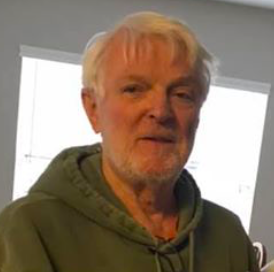
For vacations, Hank and Pat usually visit distant parts of the galaxy. Occasionally, they also time-travel.
Besides writing novels, Hank lectures on fiction writing, publishing and book marketing. He is most proud of his talk showing grammar school kids how to create a short story. He used these lectures to create an advanced ebook with embedded videos to coach the students on how to create characters, plots and settings. The target audience is 4th to 7th graders. The book’s title is Fiction Writing Workshop for Kids.

The post Zaftig the Magnificent: Talent Scout and Producer by Hank Quense appeared first on Joylene Nowell Butler.
May 10, 2020
Phyllis Zimbler Miller – POV emotion novels screenplays
Whose Emotions Are We Engaging With in Fiction?
In a webinar for writers screenwriting guru Corey Mandell talked about an important concept in point of view (POV). He said that in the dialogue blocks of a screenplay it is clear who is speaking – whose POV or emotional response we are meant to engage with.
Yet in the description sections of a screenplay, according to Mandell, it is the screenplay writer who is speaking. It is his or her POV with which we are engaging.
I’ve been pondering this concept ever since I heard Mandell talk about it — that in fiction when a character is not speaking, it is the writer himself/herself who is speaking (even though there is no such stated attribution).
We may call this the writer’s style – staccato or flowery – sparse or adjective-heavy. Yet by choosing one style over the other as a writer we are emphasizing who is speaking to our readers or viewers.
After all, the tale of one set of characters and circumstances can be portrayed in perhaps endless ways. How we as the writers relate to the characters and circumstances guides our own telling of familiar (or unfamiliar) tropes.
How can understanding this concept help make our writing more engaging for readers or viewers?
I will admit that in fiction the plot always interests me the most. Whether as a reader or writer I have to concentrate on paying attention to character feelings/emotions. And yet I know this is a weakness on my part because, as humans, we respond to other people’s feelings – and those connective feelings can hook us into a tale.
And to be hooked into a fictional character’s feelings we have to be invested in that character.
For example, I watched a few minutes of the new limited series BELGRAVIA on Epix because Julian Fellowes wrote it based on his own novel of the same title. I wasn’t immediately hooked so I turned it off.
Curious why I hadn’t responded well to BELGRAVIA, I re-watched (available on Amazon Prime) the first few minutes of the series DOWNTON ABBEY, which Julian Fellowes also wrote. And I could see clearly why in that show I was immediately hooked.
What was the difference given the same historical fiction writer of two shows with a large cast of characters and a dead love interest in both first episodes?
The answer for me: Immediate investment in the characters in DOWNTON ABBEY and total disconnect with the characters in BELGRAVIA.
And the reason for this? I knew almost immediately the disaster that had befallen the aristocratic family in DOWNTON ABBEY and that this disaster would also affect the servants. Ironically, the dead love interest doesn’t even appear on screen and yet I cared what was happening.
In BELGRAVIA I found the setup unconvincing even though the dead love interest appears briefly before he dies at the Battle of Waterloo. The storyline has no strong emotions to make me care what happens 25 years later (the timespan to which the opening of the episode jumps).
Although you may disagree with my analysis of the opening minutes of DOWNTON ABBEY and BELGRAVIA, I hope you will agree that creating a strong connection between fictional characters and readers/viewers does rely greatly on emotions. And engaging with the emotions of the writer – the puppet master pulling the strings – can help “hook” us into caring about the fictional characters.

 Phyllis Zimbler Miller is an author and screenwriter in Los Angeles. She can be reached through her website at www.PhyllisZimblerMiller.com
Phyllis Zimbler Miller is an author and screenwriter in Los Angeles. She can be reached through her website at www.PhyllisZimblerMiller.com
Phyllis Zimbler Miller
Screenwriter * Author
www.linkedin.com/in/phylliszimblermiller
http://twitter.com/ZimblerMiller
Skype: PhyllisZimblerMiller12
Member of Women in Film
Member of Military Writers Society of America
The post Phyllis Zimbler Miller – POV emotion novels screenplays appeared first on Joylene Nowell Butler.
May 6, 2020
May 2020 – IWSG: Encountering Manila
Sometimes I get an idea in my head and it consumes me. I’m like a dog with a bone. New Years Day, 2019, I decided before the year was up, I’d attend a yoga retreat in Bali. I’d spent a great deal of time in 2018 focussing on my spiritual well-being, and visiting Bali seemed the next logical step. Manila was a stop on the way.
After weeks of research, I called my travel agent, Noreen, at Paull Travel. Noreen took my visions and ideas and made me an itinerary that I could only dream of. I was set to travel at the end of September. All I had to do was find someone to go with me.
That did not happen, and by the last week in August, a voice inside my head said, rather loudly: “What the heck were you thinking?!!! You–off to Asia!!! By yourself!!! Do you even know how far that is!?!!”

 A view of Manila’s Rizal Park from my hotel room.
A view of Manila’s Rizal Park from my hotel room.
I couldn’t fly direct to Indonesia but had to land somewhere first. I chose Manila for no particular reason, other than it was in the Philippines and it was Asia… and I’d never been there.
Manila is the Capital of the Philippines, and three times the size of Vancouver, BC.
For the record, the size of Vancouver freaks me out.

My 9km cab ride from the airport to the Luneta Hotel took over 30 minutes.

There are 3000 permanent residents in Cluculz Lake, BC, 4000 in Vanderhoof, BC, and 11000 in Bucerias, Mx. Vancouver has 700K; two million if you count the entire Fraser Valley with all its municipalities.
Manila has a population of 13 million people.

Did I mention the length of the flight? 23 hours at that point.
Ten days earlier, I’d driven from Chipman, New Brunswick to Portage la Prairie, Manitoba, (by myself) which took 4 days. I visited with cousins for a week, (my back appreciated that) then flew from Winnipeg to Vancouver, (3hr 03min).
Two hours later I boarded a plane to Manila’s Ninoy Aquino International Airport. (13hr 50min). After standing in line for over an hour, I exited customs, located my driver, (he was outside holding up a big sign with my name on it) and we headed to the Luneta Hotel in Ermita.
My success during this part of my journey was significant because there were 3 terminals at the NAIA, and I, a country-pumpkin, did not get lost. It was all because of Noreen’s excellent planning.

FYI: On my trip home, I was told to be at the airport 4 hours prior to my flight. There is a very good reason for that. You need every second of those 4 hours to reach your gate on time. I’ll explain about that in next month’s post.

If you’re interested in history, particularly WW2, you can check out the significance of the Luneta Hotel during the war here. It’s a fascinating read.
President Dwight Eisenhower stayed at the Luneta for 4 years during the 40’s. I felt fortunate to be there for its 100th anniversary. My room was on the 5th top, on the right. (your other right.) The one with the three curved windows together.








The room was extravagant. Beautiful. The staff were pleasant but busy, and none of the other guests spoke English. Everyone smiled a lot. A thought crossed my mind several times that I should have waited until this year because I probably would have found someone to come with me. But of course, along came the Covid-19. If I hadn’t taken this chance I might never have seen Asia.
Every place I saw was fascinating.

Directly across the street from the Luneta Hotel was historical Rizal Park. Originally known as Bagumbayan during the Spanish Colonial Period, it was renamed after national hero José Rizal, Filipino patriot, writer and poet. He was executed there in 1896.
The Declaration of Philippine Independence from the United States was held there on July 4, 1946. Today the park is full of busts of heroic Filipinos who were also executed in the park. Many of them writers.
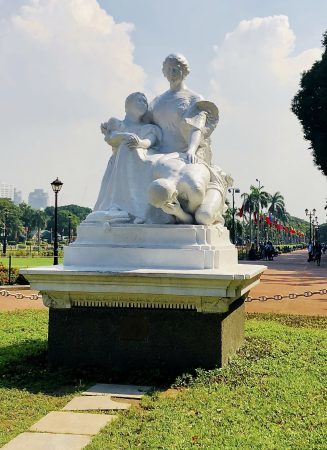
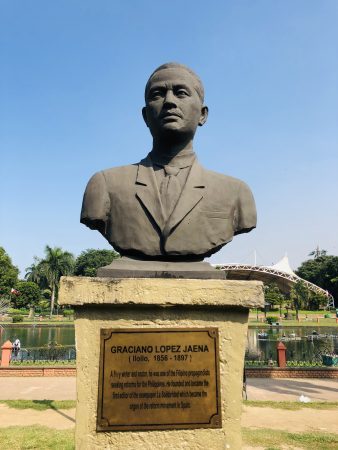
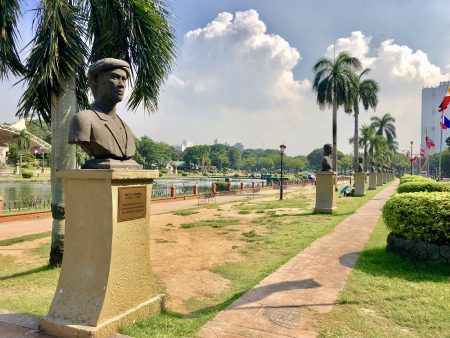
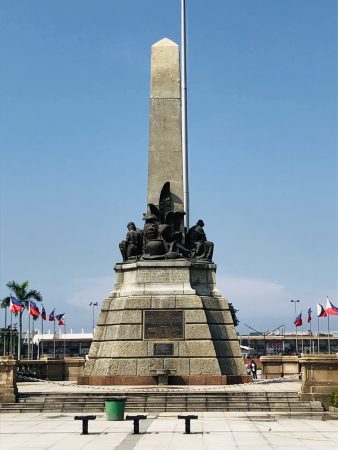
From my hotel room, I watched busloads of tourists arrive each morning, along with school buses full of children.




During my morning walkabouts, I saw things I’d never seen before: gas pumps that hung from the ceiling.

Strange forms of transportation…
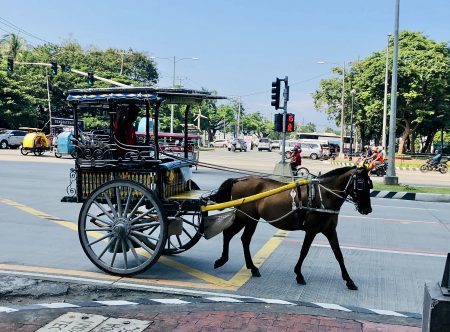




The Jeepneys are a huge part of Manila’s identity, not unlike double-deckers are in the UK. They’re the cheapest form of transportation on the island.

The one disturbing part was the children and adults begging in the streets. They were everywhere. It was very sad.
I think everything in life happens as it should. I think visiting Manila was an important part of my journey as a human being and a writer.
On the way back to the airport, the taxi driver pointed out many important landmarks and told me the next time I came I should visit the beautiful islands of the Philippines instead of spending the entire time in Manila. I told him I would, but also that I was grateful to have visited his city. It opened up my concept of the world. It broadened my horizons. It changed me as a writer.
Malacanang Palace was built in 1750 for the nobleman, Don Luís Rocha, later becoming the summer home of the Spanish governor-general.


San Agustin Museum. The monastery attached to the church was wrecked during the Second World War but was rebuilt in the 1970s and its former refectory, sacristy, crypt, halls and library now hold a museum. Doesn’t the courtyard look familiar? Like something you’ve seen in a movie?

Chinatown in the Bindondo Quarter.

The seafront on Manila Bay is the site of the Battle of Manila Bay between the United States Navy and Spain in 1898, which ended Spain’s 300 years of rule.

Fort Santiago. At the start of the Philippine Revolution in 1896-1898, the national hero José Rizal was incarcerated here before his execution. You can see where he was imprisoned, and there’s a shrine in his honour, replicating his ancestral home.
I found Manila to be a beautiful and fascinating city with much to offer any traveller. I think the historical relevance is reason enough to visit. But I recommend seeing more of the tranquil and stunning beaches.


Binondo Church was founded by the Dominicans in 1596 to serve their Chinese converts to Christianity.

Manila American Cemetery. Twenty-three American Medal of Honor recipients are buried or memorialized at the Manila cemetery. Among the honoured are the five Sullivan Brothers, who died when the USS Juneau was sunk in 1942.
Travelling so far from home by myself was very out-of-character for me and changed me in ways I’m still discerning.


IWSG was created by Ninja Captain Alex J Cavanaugh — because Alex understands we need a safe place to congregate, insecurity is part of our creative nature, and together we’re stronger.
On the first Wednesday of each month, you can write on any subject related to your writing journey or adopt the option of answering the month’s question. Either way, you’re in safe territory.
If this sounds like a good place to be, sign up here.
IWSG’s Twitter handle is @TheIWSG and hashtag is #IWSG.
Every month, a question is announced that members can answer in their IWSG post. These questions may prompt you to share advice, insight, a personal experience or story. Include your answer to the question in your IWSG post or let it inspire your post if you are struggling with something to say.
Remember, the question is optional!
May 6 question – Do you have any rituals that you use when you need help getting into the ZONE? Care to share?The awesome co-hosts for the May 6 posting of the IWSG are Feather Stone, Beverly Stowe McClure, Mary Aalgaard, Kim Lajevardi, and Chemist Ken!–namaste
joylene
The post May 2020 – IWSG: Encountering Manila appeared first on Joylene Nowell Butler.
May 2020 – IWSG: Me Encountering Manila
Sometimes I get an idea in my head and it consumes me. I’m like a dog with a bone. New Years Day, 2019, I decided before the year was up, I’d attend a yoga retreat in Bali. I’d spent a great deal of time in 2018 focussing on my spiritual well-being, and visiting Bali seemed the next logical step. Manila was a stop on the way.
After weeks of research, I called my travel agent, Noreen, at Paull Travel. Noreen took my visions and ideas and made me an itinerary that I could only dream of. I was set to travel at the end of September. All I had to do was find someone to go with me.
That did not happen, and by the last week in August, a voice inside my head said, rather loudly: “What the heck were you thinking?!!! You–off to Asia!!! By yourself!!! Do you even know how far that is!?!!”

 A view of Manila’s Rizal Park from my hotel room.
A view of Manila’s Rizal Park from my hotel room.
I couldn’t fly direct to Indonesia but had to land somewhere first. I chose Manila for no particular reason, other than it was in the Philippines and it was Asia… and I’d never been there.
Manila is the Capital of the Philippines, and three times the size of Vancouver, BC.
For the record, the size of Vancouver freaks me out.

My 9km cab ride from the airport to the Luneta Hotel took over 30 minutes.

There are 3000 permanent residents in Cluculz Lake, BC, 4000 in Vanderhoof, BC, and 11000 in Bucerias, Mx. Vancouver has 700K; two million if you count the entire Fraser Valley with all its municipalities.
Manila has a population of 13 million people.

Did I mention the length of the flight? 23 hours at that point.
Ten days earlier, I’d driven from Chipman, New Brunswick to Portage la Prairie, Manitoba, (by myself) which took 4 days. I visited with cousins for a week, (my back appreciated that) then flew from Winnipeg to Vancouver, (3hr 03min).
Two hours later I boarded a plane to Manila’s Ninoy Aquino International Airport. (13hr 50min). After standing in line for over an hour, I exited customs, located my driver, (he was outside holding up a big sign with my name on it) and we headed to the Luneta Hotel in Ermita.
My success during this part of my journey was significant because there were 3 terminals at the NAIA, and I, a country-pumpkin, did not get lost. It was all because of Noreen’s excellent planning.

FYI: On my trip home, I was told to be at the airport 4 hours prior to my flight. There is a very good reason for that. You need every second of those 4 hours to reach your gate on time. I’ll explain about that in next month’s post.

If you’re interested in history, particularly WW2, you can check out the significance of the Luneta Hotel during the war here. It’s a fascinating read.
President Dwight Eisenhower stayed at the Luneta for 4 years during the 40’s. I felt fortunate to be there for its 100th anniversary. My room was on the 5th top, on the right. (your other right.) The one with the three curved windows together.








The room was extravagant. Beautiful. The staff were pleasant but busy, and none of the other guests spoke English. Everyone smiled a lot. A thought crossed my mind several times that I should have waited until this year because I probably would have found someone to come with me. But of course, along came the Covid-19. If I hadn’t taken this chance I might never have seen Asia.
Every place I saw was fascinating.

Directly across the street from the Luneta Hotel was historical Rizal Park. Originally known as Bagumbayan during the Spanish Colonial Period, it was renamed after national hero José Rizal, Filipino patriot, writer and poet. He was executed there in 1896.
The Declaration of Philippine Independence from the United States was held there on July 4, 1946. Today the park is full of busts of heroic Filipinos who were also executed in the park. Many of them writers.




From my hotel room, I watched busloads of tourists arrive each morning, along with school buses full of children.




During my morning walkabouts, I saw things I’d never seen before: gas pumps that hung from the ceiling.

Strange forms of transportation…





The Jeepneys are a huge part of Manila’s identity, not unlike double-deckers are in the UK. They’re the cheapest form of transportation on the island.

The one disturbing part was the children and adults begging in the streets. They were everywhere. It was very sad.
I think everything in life happens as it should. I think visiting Manila was an important part of my journey as a human being and a writer.
On the way back to the airport, the taxi driver pointed out many important landmarks and told me the next time I came I should visit the beautiful islands of the Philippines instead of spending the entire time in Manila. I told him I would, but also that I was grateful to have visited his city. It opened up my concept of the world. It broadened my horizons. It changed me as a writer.
Malacanang Palace was built in 1750 for the nobleman, Don Luís Rocha, later becoming the summer home of the Spanish governor-general.


San Agustin Museum. The monastery attached to the church was wrecked during the Second World War but was rebuilt in the 1970s and its former refectory, sacristy, crypt, halls and library now hold a museum. Doesn’t the courtyard look familiar? Like something you’ve seen in a movie?

Chinatown in the Bindondo Quarter.

The seafront on Manila Bay is the site of the Battle of Manila Bay between the United States Navy and Spain in 1898, which ended Spain’s 300 years of rule.

Fort Santiago. At the start of the Philippine Revolution in 1896-1898, the national hero José Rizal was incarcerated here before his execution. You can see where he was imprisoned, and there’s a shrine in his honour, replicating his ancestral home.
I found Manila to be a beautiful and fascinating city with much to offer any traveller. I think the historical relevance is reason enough to visit. But I recommend seeing more of the tranquil and stunning beaches.


Binondo Church was founded by the Dominicans in 1596 to serve their Chinese converts to Christianity.

Manila American Cemetery. Twenty-three American Medal of Honor recipients are buried or memorialized at the Manila cemetery. Among the honoured are the five Sullivan Brothers, who died when the USS Juneau was sunk in 1942.
Travelling so far from home by myself was very out-of-character for me and changed me in ways I’m still discerning.


IWSG was created by Ninja Captain Alex J Cavanaugh — because Alex understands we need a safe place to congregate, insecurity is part of our creative nature, and together we’re stronger.
On the first Wednesday of each month, you can write on any subject related to your writing journey or adopt the option of answering the month’s question. Either way, you’re in safe territory.
If this sounds like a good place to be, sign up here.
IWSG’s Twitter handle is @TheIWSG and hashtag is #IWSG.
Every month, a question is announced that members can answer in their IWSG post. These questions may prompt you to share advice, insight, a personal experience or story. Include your answer to the question in your IWSG post or let it inspire your post if you are struggling with something to say.
Remember, the question is optional!
May 6 question – Do you have any rituals that you use when you need help getting into the ZONE? Care to share?The awesome co-hosts for the May 6 posting of the IWSG are Feather Stone, Beverly Stowe McClure, Mary Aalgaard, Kim Lajevardi, and Chemist Ken!–namaste
joylene
The post May 2020 – IWSG: Me Encountering Manila appeared first on Joylene Nowell Butler.
April 20, 2020
SWOT Analysis For New Fiction Writers
by Hank Quense
Whenever you start a new endeavor you face a learning curve. When you graduate from college and start a job, there’s a learning curve. Enter a trade school and you’ll be on a learning curve for the entire term. Want to take up knitting as a hobby? There’s a learning curve for that. So too with writing fiction. It has a learning curve.
That’s what this article is about: the learning curve for fiction writing.
Books on fiction writing don’t talk about the learning curve. It’s as if they assume you already know the learning curve exists, so they don’t bother to talk about what is involved with learning to write fiction.
The purpose of this article is to point out where you are at if you’re just beginning to write. In that case, you are at the starting point of the learning curve.
This isn’t meant to discourage you. Rather, it will roadmap the way forward using a SWOT analysis to give you a plan.
SWOT stands for Strengths, Weaknesses, Opportunities and Threats. It is a popular way to analyze a situation in order to identify ways of improving the situation.
Its main value as an analytical tool is to point out areas that can be worked on to improve the situation. It’s essential that you view the SWOT analysis in that light. Don’t take it as an insurmountable list of obstacles.
Let’s talk about your strengths first.
Strengths
All new writers bring these strengths to their fiction:
EnthusiasmFresh ideas and approachesEnergyThe primary objective of a SWOT analysis is to grow this list of strengths. What follows is an explanation of these current strengths.
Enthusiasm: As a newbie writer you are probably brimming with enthusiasm and bursting with story ideas. This is a great strength and you have to fight to keep it at a high pitch.
Fresh Ideas and Approaches: Enthusiasm leads to lots of new ideas. This is another strength since writing fiction is dependent upon ideas, creativity and new approaches to stories.
Energy: New writers bring boundless energy to a new project. Keep the energy level high is necessary and it is tough in the face of conflicting demands on your time.
It’s important to keep these strengths from deteriorating over time and to grow the list.
Weaknesses
Weakness are areas the writer has to work on to improve.
Weak Story Design skillsWeak story-telling skillsLack of a support groupInexperienceThese weaknesses must be addressed. In a SWOT analysis, the value of identifying the weakness is to expose them so they can be worked on. These weaknesses should be viewed as areas that can be turned into strengths over time.
Weak story design skills: Starting out means you don’t have much experience in developing characters or plots. Your initial stories may not have a character arc or an emotional arc. Scene design may be something you’ve never heard of. All of these areas fall under the story design issue. The good news is that this weakness can be resolved over time by studying and by writing stories. This weakness is especially vulnerable to critiquing. Having other writers critique your stories is perhaps the fastest and best way to change this weakness into a strength.
Weak story-telling skills: Story-telling skills, especially written stories, are not something we are born with. These skills must be developed through writing stories and getting them critiqued. Story-telling topics to be addressed include point-of-view — perhaps the most technical area of fiction writing. Others are show-don’t-tell, stimulus & reactions, foreshadowing and effective dialog. The good news is that this weakness can also be eliminated through study and writing.
Lack of a support group: In the beginning you are alone. You probably have few contacts who are also writers and you may not know anyone who can offer valid criticism of your stories. Family members don’t count unless they are also writers. Non-writers don’t have the knowledge to tell you how to improve your story and your writing. Only other writers can do that. Over time, your list of contacts will grow and this weakness will diminish.
Inexperience: The problem here is that inexperience means you will make a lot of mistakes. Another issue is that, with your inexperience, you don’t know that you are making mistakes. With critiquing, these mistakes will be exposed and your inexperience will lessen. Another weakness will bite the dust.
Opportunities
These opportunities are waiting for you to exploit them.
New areas of learningImprove fiction writing skillsDevelop a writing voiceYou may not be able to address these areas immediately for a number of reasons. These reasons may include: not enough time right now; too much other work at present; may involve expenses that can’t be covered at this time. Usually the primary reason is that your workload is too heavy to allow you to spend time on these opportunities. Nevertheless, the opportunities exist and are waiting to be exploited.
The best way to approach these opportunities is to choose one of them at a time to work on. Selecting all of them will probably ensure that none of them get exploited.
New areas of learning: There are many books on a variety of writing topics. Poetry is a possibility as are scripts and stage plays.
Improve fiction writing skills: This one doesn’t need much direct involvement since you’ll actually be addressing it every time you write a story or even work on the story design issues such as creating characters.
Develop a writing voice: This is an essential growth possibility for any writer. The simple fact is you can’t write a story using your speaking voice. You have to develop a separate and distinct writing voice. Once again, writing stories will help on this issue.
Threats
There are a number of threats you must deal with in the early stages of your writing career:
InertiaWriting is toughGetting published is toughDiscouragementToo many story ideasThe cumulative effect of these threats can be decision to stop writing and move on to something else. That would be a mistake. Several of the threats shown here actually dissipate over time and with constant writing.
Inertia: Inertia is always a threat and can happen at any time. It usually appears as a reluctance to sit in front of a computer and write. An occasional day off is nothing to worry about, but when it happens consistently it is a sign that inertia has moved in. This often occurs after a series of setbacks such as rejections or critiques that rip apart your latest work. I think the inertia effect is quite natural, but it has to be shaken off. Getting back to writing is the best solution. Starting a new writing project is often the cure for inertia.
Writing is tough: Writing quality stories requires skill and craftsmanship. Both of these qualities can be acquired over time, but they require hard work and constant striving to improve. This can wear one down and negative consequences will result.
Getting published is tough: Besides the high standards that many editors and publishers have established, there is an ever expanding number of competitors striving for a small number of publishing slots in magazines and publishing houses
Discouragement: Based on the above threats, you can see that discouragement seems almost natural. It takes great effort to fend off this discouragement and to keep writing and submitting
Too many story ideas: This may seem strange, but it is a real threat. Once you get the hang of story design and what is required to create a story, you may get flooded with good story ideas, so many that there isn’t enough time to write them all. This can lead to a sort of paralysis as you wonder what to work on while a dozen potential stories are competing for your attention. The upshot frequently is that none of them get worked on as you struggle to prioritize them.
In conclusion
Over time, your efforts to change the threats and weaknesses will pay dividends. At the end of a year, the chart will be different. At the end of two years, the chart will be very much different.
However, if you make a new analysis at that time, you will end up with a chart that has an entirely new set of Weaknesses and Threats. Hey, that’s life. To compensate, the new analysis will also have a new and much longer set of Strengths and Opportunities.
Two of the identified weakness can be addressed by enrolling in online courses. Two of these are my Story Design and Story-telling techniques. Both are available through Udemy. You can find out more by following this link: https://bit.ly/32Kb7TI


For vacations, Hank and Pat usually visit distant parts of the galaxy. Occasionally, they also time-travel.
Besides writing novels, Hank lectures on fiction writing, publishing and book marketing. He is most proud of his talk showing grammar school kids how to create a short story. He used these lectures to create an advanced ebook with embedded videos to coach the students on how to create characters, plots and settings. The target audience is 4th to 7th graders. The book’s title is Fiction Writing Workshop for Kids.

The post SWOT Analysis For New Fiction Writers appeared first on Joylene Nowell Butler.
April 2, 2020
Phyllis Zimbler Miller – COVID-19: When Words Are All We Have
COVID-19: When Words Are All We Have
We writers may have a small advantage during the COVID-19 pandemic: Most or many of us truly believe in the power of words both to help – and hurt – others.
After all, when we obsess over whether we chose the correct word to describe something, we are recognizing the power that each individual word can have in communicating the correct or incorrect meaning for what we are trying to express.
Why is this so important now?
In a time when we are fragile both physically and emotionally, it is imperative that we take extra care with our words.
For example, before the start of a prayer service held via Zoom, I heard participant #1 greet participant #2 by saying he hadn’t seen participant #2 for some time. In normal circumstances that might appear to be a pleasant greeting, yet in this specific prayer service, the greeting could be seen as a reprimand. (Participant #2 was clearly at a loss for words when asked “Where have you been?”) The better and more sensitive approach would have been a greeting that only said “How nice to see you.”
Or take the account of a first responder who felt so badly that he couldn’t physically comfort (his usual practice) someone whose wife had just died. The first responder bemoaned he could only use words to comfort the husband.
Now could be the time to use our writing abilities to comfort those in isolation.
Perhaps your elderly parents live across the country. This might be a good opportunity to interview them via phone on their childhood memories. Then you can write those memories so these can be shared with other family members.
My 95-year-old father Al Zimbler died in the early hours of March 19 (not from the virus). Since I couldn’t fly from Los Angeles to Chicago for the funeral, I found another way to honor his memory:
I went through his eight humorous short story books (published on Amazon) looking for the asterisk next to a short story title that indicated a true story. Then I created a page on his comedy website with links to all the true stories in chronological order (or the best order I could figure out). When people called or emailed me about his death, I sent them the link to the true stories (see http://www.alzimcomedy.com/true-stories-al-zimbler/).
Perhaps an organization that you support needs someone to volunteer to write emails to organization members. Or your synagogue or church needs help creating phone scripts to explain changes (especially for people who don’t use email).
I just received an email from a member of the Great Books discussion group to which I belong. Because some of the members aren’t very tech savvy, we have not yet tried Zoom meetings as other book discussion groups have. Instead this member shared his thoughts on the books he read for which we weren’t able to have our discussion meetings. (We set up our two-books-a-month reading schedule a year ahead of time, so we all have the list of the books for 2020.)
Consider starting an online discussion with your friends to share your thoughts on the different books you are each currently reading (or listening to) or on other shared interests. Email and Zoom may have to be our public forums for a considerable length of time.
In conclusion, Joylene and I welcome you to add in the comments below more ideas of how we can use our writing abilities (from the safety of our own homes) to reach out to others in this time of COVID-19.

 Phyllis Zimbler Miller is an author and screenwriter in Los Angeles. She can be reached through her website at www.PhyllisZimblerMiller.com
Phyllis Zimbler Miller is an author and screenwriter in Los Angeles. She can be reached through her website at www.PhyllisZimblerMiller.com
Phyllis Zimbler Miller
Screenwriter * Author
www.linkedin.com/in/phylliszimblermiller
http://twitter.com/ZimblerMiller
Skype: PhyllisZimblerMiller12
Member of Women in Film
Member of Military Writers Society of America
The post Phyllis Zimbler Miller – COVID-19: When Words Are All We Have appeared first on Joylene Nowell Butler.
March 31, 2020
IWSG – April: Dancing with Dementia (+ Giveaway)
Dear IWSGers, instead of answering this month’s question, I’d like to showcase fellow Canadian Jemi Fraser’s new book Dancing with Dementia. Things are fine in my world. Yes, I am sad, but I’m also grateful for many blessings. Today Jemi’s book seems more important than anything I have to say. Though I promised I’d share my Bali adventure, I think that’s best left for another day.
Jemi has some interesting questions at the bottom of her post. Check them out. And don’t forget to visit all our co-hosts this month. They’re the reason no one’s IWSG post is left unvisited. Thanks, everyone!


It’s a pleasure to be participating in author Jemi Fraser’s DANCING WITH DEMENTIA, Recognizing and Coping with the Early Stages of Dementia Blog Tour through MC Book Tours today.
The author is offering a tour-wide international giveaway of an Amazon Gift Card. More information on the giveaway is listed below.
Recognizing and Coping with the Early Stages of Dementia
by Jemi Fraser
◊ Genre: Nonfiction, Memoir
◊ Publisher: Just Jemi Books
◊ eBooks
◊ ISBN-13: 978-1-9991258-1-3
Dementia and Alzheimer’s touch the lives of millions around the world, but so much is still unknown.
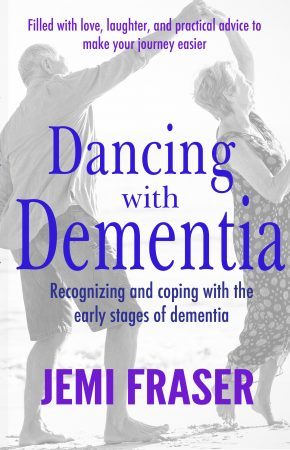
As first-generation Canadians, we didn’t recognize the early warning signs. We didn’t know the differences between regular aging and the early stages of dementia. We’ve made mistakes but we’ve learned a lot.
DANCING WITH DEMENTIA
will help you:
•Identify those early warning signs
•Use visuals to improve communication
•Choose your words wisely
•Redirect and reassure
•Stay calm and cope with your own emotions
•Consider nursing home options
•Improve caregiver self-care
We’ve learned to dance the early steps of the disease with our love and laughter intact. If you are looking for help recognizing early signposts along with practical ways to cope with early Dementia and Alzheimer’s, this book is for you.
DANCING WITH DEMENTIA buy links:
Amazon.com Amazon.ca Apple Books Barnes & Noble Kobo
Add DANCING WITH DEMENTIA to your Goodreads shelf

For those who aren’t familiar with the author, here’s a bit of background on her.
Jemi Fraser writes both fiction and nonfiction. Her nonfiction work focuses on the ways that dementia has impacted her family. Her fiction work varies from contemporary romance to suspense and flash fiction. Years as a teacher have taught Jemi that life is short and that happy endings are a must.
 Jemi lives in Northern Ontario, Canada where snow is always a topic of conversation and the autumn leaves make everything better.
Jemi lives in Northern Ontario, Canada where snow is always a topic of conversation and the autumn leaves make everything better.
For more on Jemi and her writing, visit her following sites:
Website Just Jemi Blog Dancing With Dementia blog
Amazon Page BookBub Goodreads Facebook Twitter Quick Tips Videos
GIVEAWAY DETAILS:
This tour-wide giveaway is for a $20 Amazon Gift Card. The giveaway is open internationally.
To enter the giveaway, just click on the Rafflecopter widget below and follow the instructions. The widget may take a few seconds to load so please be patient. If the widget doesn’t show up, just click HERE and you’ll be directed to the widget.
Thanks for stopping by and be sure to follow Jemi on her week-long tour HERE. You never know what you might find out. I hope dementia hasn’t touched your family or friends, but in case it has do you have any tips to share on dealing with this terrible disease?
Nonlinear Writing
I’m normally a fiction writer. My novels are currently focused on romance & romantic suspense. I write flash fiction in all kinds of genres. Writing a nonfiction book, and a highly personal one at that, was a big change, not only in genre but in writing style.
When writing a fiction story, I start with a flash of emotion and build a character & scene for that. The scene floats around in my subconscious for a while. I’m learning to plot, so I try that, and then I write. From the first scene to the last.
Dancing With Dementia has an overall linear trajectory, but within the book it’s not always a linear story. And I didn’t write it in a linear fashion. In fact, I didn’t begin writing it intentionally at all.
When we were living the incidents in the Bowels of Hell: Sleep Deprivation Makes Everything Funny section of the book, I started writing down snippets of stories.
At first, I wrote things down for a couple of reasons:
I wanted to rememberI couldn’t believe what had happenedWe wanted a timeline and running record of some of mom’s behaviours and conversationsI was tired and drained enough to need an external memory for what worked to help Mom and what just annoyed herI had no original intention of writing a book. I was just trying to make sense of our world and find ways to help our mom.
For many long months, we kept living as best we could and I kept recording.
One of our family members suggested I compile the snippets into a book, a guide that might help other families.
So, I started organizing the stories, looking for themes and connections. Eventually the organization of the book became clear. A section for every area of life that was a challenge for Mom, all building toward a nursing home placement.
In its final version, the book can be read a couple of ways. Of course, you can read it start to finish. That’s probably best.
But, helping someone through the early stages of dementia takes a lot of time and energy from your life. If you’re in that stage, you might not have enough connected time to read the book in a straight shot.
Instead, it might be better to dip into an area that might help you at the time. Dip in again on another day in another section. Driving, finances, phones, living alone, outside agencies, talking about nursing homes,…
Dip into the tips section at the back, especially for those wondering if dementia is creeping in or looking for ideas on how to redirect.
I’m not sure I could ever write in a nonlinear fashion for fiction, but it was a method that worked extremely well for this book.
How about you? If you’re a writer, do you write in a linear fashion or are you able to jump from scene to scene and then weave them together later? Is there a difference in how you write fiction and nonfiction? If you’re not a writer, do you have another way of making sense of your world other than writing it down? Do you prefer stories told in a linear fashion?


IWSG was created by Ninja Captain Alex J Cavanaugh — because Alex understands we need a safe place to congregate, insecurity is part of our creative nature, and together we’re stronger.
On the first Wednesday of each month, you can write on any subject related to your writing journey or adopt the option of answering the month’s question. Either way, you’re in safe territory.
If this sounds like a good place to be, sign up here.
IWSG’s Twitter handle is @TheIWSG and hashtag is #IWSG.
Every month, we announce a question that members can answer in their IWSG post. These questions may prompt you to share advice, insight, a personal experience or story. Include your answer to the question in your IWSG post or let it inspire your post if you are struggling with something to say.
Remember, the question is optional!
April 1 question – The IWSG’s focus is on our writers. Each month, from all over the globe, we are a united group sharing our insecurities, our troubles, and our pain. So, in this time when our world is in crisis with the covid-19 pandemic, our optional question this month is: how are things in your world?The awesome co-hosts for the April 1 posting of the IWSG are Diane Burton, JH Moncrieff, Anna @ Emaginette, Karen @ Reprobate Typewriter, Erika Beebe, and Lisa Buie-Collard!The post IWSG – April: Dancing with Dementia (+ Giveaway) appeared first on Joylene Nowell Butler.
March 20, 2020
Characters File Lawsuit – Hank Quense
(Author’s note: In my last report https://joylenebutler.com/help-i-need-advice-hank-quense/.html I explained that my characters have their knickers bunched up. My research has uncovered some of their activities. Here is a report I’ve managed to piece together.)

In Dun Hythe, Gundarland’s largest city, the bailiff called out “All rise!” and Judge Oakenleaf, an old elf, hobbled into courtroom. He wore the traditional carmine robe and peruke. With an effort, Oakenleaf ascended the step to his bench and sat down with an audible creaking of joints. He looked around the mostly empty and quiet courtroom. A fierce look came over his face and he pounded the gavel before ordering, “Quiet in the courtroom!” He scowled at the three plaintiffs standing silently in front of the bench. “If I hear another outburst like that one, I’ll clear the court.”
The plaintiffs exchanged worried glances.
“Who are you?” Oakenleaf pointed to the plaintiff on his right.
“My name is Sir Vatsik. I’m a knight-accountant.” He was a young man dressed in a tunic, pants and hose.
“I’m Brodwin, a wizard and a member of the Dun Hythe Wizards Guild.” The elderly man wore a robe festooned with symbols.
“Bianca,” a tall elf maiden said. “I’m an archer.” Her bow and quiver of arrows had been left outside along with Brodwin’s shillelagh-like wand and Vatsik’s sword and shield. Bianca wore a green hooded shirt and trews in the same color. Her silver hair hung down in two braids.
Oakenleaf cleared his throat. “Why are bothering me?”
Brodwin took a step forward. “We started a class action lawsuit against an author named Hank Quense.”
Oakenleaf frowned, lifted his wig and scratched his bald head. He dropped the wig back on his head skewed to one side. “Never heard of him.”
“He claims to be famously unheard of,” Vatsik said.
“That makes sense,” Oakenleaf said. “What’s this lawsuit about?”
“We are suing for unemployment compensation until he writes us into a new story,” Brodwin said.
Oakenleaf ignored the wizard and said, “Bailiff, I thirst.” He stopped the proceedings until the bailiff returned with a glass of liquid with a slight amber tint. Oakenleaf sipped for the glass. “Excellent vint . . . water.”
The judge squinted and examined each of the plaintiffs. “This lawsuit sounds suspicious to me. Why should the author pay you compensation?”
“Because,” Vatsik replied, “I don’t earn any coins when we aren’t in a story.”
“Likewise, I can’t use my spells unless I’m active in a story,” Brodwin added.
“The same with me,” Bianca said, “but I’m also suing for breach of promise.”
“Why,” the judge asked her.
“In a novel, the king and I decided to get married. But the story ended before we could get hitched. I’m gonna die an old maid if the author doesn’t get me into a new story so I can get married.”
“Hmm.” The judge drained his glass. “Bailiff, fetch a refill of this . . . er water.” He tapped the gavel a few times and said, “Your pos—“ He glared around the room. “Stop that singing or I’ll clear the room! Is that clear?” He paused a few seconds. “Much better. I hate that song. Where was I?”
“You were about to rule on our complaint,” Brodwin said. “I think.”
“Ahh, yes. I believe your complaint is legitimate, but I can’t rule untll I hear from the author. Bailiff!”
“Judge?” the bailiff placed another glass of liquid on the bench.
“Issue a subpoena for the author. Have him appear in this court in say . . . two weeks.”
“It’s gonna be hard to serve the subpoena,” Vatsik said. “No one knows where the The guy lives. We’ve been lookin’.”
“That’s his problem,” Oakenleaf said. “If he doesn’t show up on time, I’ll have some vigilantes go after him and drag him here.” Oakenleaf banged the gavel. ’This court is adjourned.”
“Wait,” Brodwin said, “we didn’t discuss the compensation we want.”
“Too late, I have to pee. This court is adjourned.”
(Author’s note: Vatsik and Brodwin both appear in several short stories. Bianca is a major character in The King Who Disappeared)
~ ~ ~
Three weeks later, Judge Oakenleaf sat on the bench. His white peruke, was skewed to one side so it draped over his right ear. A bailiff stood alongside the bench. Three males stood in front of the judge.
“Annouce yourselves,” the judge ordered.
“My name is Zarro,” said a dwarf dressed all in black: shirt, pants boots, hat, cape, bullwhip and mask.
“And I’m the Lone Stranger.” Another dwarf, this one wore brown leather breeches, a gray wool sweater and a tan cloak. His black boots matched the color of his mask. A holster held a slingshot.
“I am called Pinto,” said a tall elf who pointed to the Lone Stranger. “I am his companion.” Pinto wore tan leather tunic, breeches and boots.
Oakenleaf frowned and said, “if you are the Lone Stranger, why are there two of you?”
Startled, the Lone Stranger paused before replying,” He’s an elf. Elves don’t count. I’m the Lone dwarf Stranger.”
“All dwarves are strange, “Pinto said, “but this one is stranger.”
“One more crack about elves and I’ll hold you in contempt of court,” Oakenleaf growled. “A week in jail will change your mind about elves.”
Oakenleaf scratched under his wig and continued, “You two vigilantes are empaneled as my posse to track down and apprehend a rogue who didn’t respond to my subpoena to appear in my court. The rogue’s name is Hank Quense and I want him standing in front of me in chains. Am I clear?”
“The name sounds familiar,” the Lone Stranger said.
Pinto kicked his ankle. “He’s the author who created us.”
“Ahh, now I remember.”
“Where is this rogue?” Zarro asked.
“If I knew where he lived, I could hand the job off to a policeman instead of a vigilante. Finding him is your job. Bailiff, give them a copy of my subpoena.”
”All this tells us is his name,” Zarro said after reading it. “Not very useful.”
“Bah! You youngsters want everything to be easy.” Oakenleaf pointed his gavel at Zarro. “None of you want to work for your coins. Well, be on your way and if you don’t bring this author back in a reasonable time, I’ll hold all three of you in contempt.” Oakenleaf stood, tottered off the step and disappeared through a door followed by the bailiff.
Outside the courtroom, the Lone Stranger said, “This is tough one. Where should we start?”
“Let’s ride south for a while,” Zarro replied, “then we can turn left and see if anyone knows where the guy is.”
“Sounds good,” the Lone Stranger said.
Pinto shook his head. “We’re all going to jail before this one is over. I can feel it.”
(Author ’ s note: Zarro, the Lone Stranger and Pinto all appeared in the story Chasing Dreams.)
~ ~ ~
Dun Hythe Times Editorial
It has come to the attention of this newspaper that a number of characters created by our renowned author Hank Quense have launched a class action lawsuit against the author. The characters are seeking unspecified unemployment compensation from him since they are all currently without work.
This is nothing more than a scurrilous attempt to use their fame to extort money from an innocent author. We ask, to whom do these characters owe their fame? More, to whom do they owe their very existence? The answer to both questions is to the author. Yet the grateful louts now sue their very creator.
This paper demands this pernicious lawsuit be thrown out of court and the lead litigants whipped through the streets as a lesson to others whose greed gets the better of them
For shame!
~ ~ ~
Zarro, the Lone Stranger and Pinto sat at a table in a nearly deserted saloon on the edge of the Great Southern Desert. They had been on the road for over a month and had traveled throughout Gundarland. During their journey, they could find no one who had any idea where the author Hank Quense lived.
Three shot glasses and a half-empty quart bottle of sarsaparilla soda sat on the table. The vigilantes were dirty, exhausted and depressed.
Zarro poured three more shots of soda. “So what are we gonna do?”
“I have a suggestion,” Pinto said, “if you want to hear from an elf.”
“In desperate times like these,” the Lone Stranger replied, “even an elf’s words are welcome.”
“Let’s ask a librarian about the author.”
“Why would we do that?” Zarro asked.
“Librarians work in buildings filled with books. They may know about our author.”
“And where would we find such a librarian?” Zarro asked.
“Centi has the largest library in Gundarland. And Centi ain’t that far away from here.”
“I hate to admit it,” the Lone Stranger said, “but I think Pinto’s idea has merit.”
“Then let’s do it.” Zarro stood up.
“I ain’t leavin’ until we finish this bottle,” the Lone Stranger replied.
“Good thinkin’.” Zarro sat down and poured more shots.
~ ~ ~
The Centi library was a large, ornate structure covered in pink marble with six columns flanking the entrance. Centi and its citizens suffered from an inferiority complex. It was always second to the northern city of Dun Hythe. That city was larger than Centi, had a bigger sea port and the folks who lived there looked down on the Centians. The library was Centi’s attempt to even the score.
The vigilantes stood in awe at the entrance for a few moments before entering. The high-ceiling in the main reading room reminded them of a temple in Dun Hythe.
Looking around the almost empty room, Zarro said, “There’s someone who may help us.” He pointed to a figure standing behind a desk on the far side of the room. The figure was shroud in semi-darkness. “I’ll bet it’s a librarian.”
As they approached they could discern the features of the librarian. He was an elf dressed in formal attire and he looked like he was in pain.
“Hello,” the Lone Stranger said. “We’re lookin’ for a librarian who can help us.”
The elf made a face at the three road-dirt covered vigilantes. “Surely, you do not expect me to teach you how to read. The library walls are filled with signs on how to find information.”
“We’re tryin’ to find an author,” Zarro said. “Can you help us?”
The elf sighed. “Perhaps. What is the author’s name.”
“Hank Quense,” Zarro replied.
The elf’s eyebrows rose marginally. “And why would three ruffians want to know about a prestigious author like Mister Quense?”
“We’re vigilantes, see,” the Lone Stranger said, “and we gotta serve him with a subpoena.”
“Hah! You will have enormous troubles serving Mister Quense. Wherever it is he lives, it is far, far away. When we order his books, it takes two years for the order to be fulfilled. All our other book orders are filled with a month.”
“But you don’t where he is?” Pinto asked.
“No. Now leave me. I have work to do.”
Pinto snorted. “All we saw you doing was looking around the room.”
“That is my work.” The elf made shooing motions with his hands. “Leave, so I can get back to overseeing the room.”
Outside the library, the three stood around, wondering what to do next.
“No sense travelin’ around anymore.” The Lone Stranger reached under his mask and scratched his nose. “I’m thinkin’ the author ain’t in Gundarland.”
Zarro gasped aloud. “I’m not goin’ onna ship to another country. I get seasick.”
“Does anyone what to hear what I think,” Pinto asked.
“I suppose it’s possible that words of wisdom can come outta the mouth of an elf,” the Lone Stranger said. “Tell us.”
“I think this author lives on a different world where he makes up all the stuff he writes. The only way we’ll find him is to ask the zaftans for help. They might know where he lives and even if they don’t, they may be able to take us to a different world where we can continue to search.”
“I take back what I said about possible words of wisdom,” the Lone Stranger slapped his forehead.
Zarro shook his head. “Talkin’ to the zaftans is even worse than gettin’ onna ship. Their smell makes me sick and I throw up.”
“We’re screwed,” the Lone Stranger said. “If we don’t find the guy our reputations will be ruined. No one will ever hire us again.”
“And the judge will hit us with contempt of court,” Zarro said. “We’ll be in jail.”
Pinto chuckled. “I guess it’s time for you two to stop pretending to be vigilantes and get real jobs.”
“That’s not funny, Pinto,” the Lone Stranger growled.
“Still, the elf speaks the truth.” Zarro shook his head.. “Change our names, don’t tell anyone about this subpoena and start over. I always fancied bein’ a forest ranger.”
“I’d have to go back to my family business. They’re into minin’ and I can’t stand being in a mine shaft. I need to do somethin’ else.”
“Let’s all of us become forest rangers,” Zarro said.
“Yeah,” the Lone Stranger replied. “The judge will never look for us in the woods.
(Author’s note: My information indicates other characters are plotting mayhem. More reports will follow.)


For vacations, Hank and Pat usually visit distant parts of the galaxy. Occasionally, they also time-travel.
Besides writing novels, Hank lectures on fiction writing, publishing and book marketing. He is most proud of his talk showing grammar school kids how to create a short story. He used these lectures to create an advanced ebook with embedded videos to coach the students on how to create characters, plots and settings. The target audience is 4th to 7th graders. The book’s title is Fiction Writing Workshop for Kids.

The post Characters File Lawsuit – Hank Quense appeared first on Joylene Nowell Butler.
March 10, 2020
Phyllis Zimbler Miller – Story Telling Responsibilities
PSAs in Fiction Mar 2020 rev
The Public Service Responsibility of Fiction Writers
Although this is a rather formal title for a blog post, I wanted to start out with a clear thesis:
When we write fiction – novels, screenplays, short stories, poems, limericks – we should encourage responsible societal behaviors whenever possible.
Safer sex portrayal:
Unless there is an absolute necessity in your fiction for an unplanned pregnancy, fictional characters should practice safer sex. And even if you need an unplanned pregnancy, it can be attributed, for example, to a defective condom.
Why is this important? Because for many, many people fictional characters are real people, and their fictional behavior encourages emulation by real-life people.
As a fiction writer you don’t want to be responsible for real-life teen pregnancies because you had two teen characters not use easily available contraception.
Protective helmets:
A bicycle helmet saved my father on a bicycle when a car hit him, and a bicycle helmet (or motorcycle helmet or a certified protective helmet worn when skateboarding, rollerblading, etc.) can save others. If you can work it in when your 10-year-old characters ride their bikes or skateboard together, mention their nifty helmets.
Safety belt safe:
Of course you always want to include safety belt usage for adults and safety car seats for young children when you can. While everyone should protect themselves in this way, as fiction writers we can remind people of this for their own safety.
No sliding down banisters:
This is a very personal one for me. Years ago my first cousin slid down a banister at college and never walked again. Every time I see a kid sliding down a banister in a commercial or film/TV show I cringe. Please do not encourage such irresponsible behavior.
Cruelty to pets:
A member of the Great Books discussion group to which I belong discussed with me the unnecessary depiction of cruelty to animals in films and TV. If your plot doesn’t require this depiction, don’t do it. (And it is actually a lazy way to portray the character of a bad person by having him/her kick a cat.)
Smoking or vaping:
For many years smoking portrayal in non-period pieces has been missing on the screen. Now I’ve started to see an increase in this portrayal. In my opinion this is a lazy way of portraying nervousness or someone pausing before speaking. As fiction writers let’s come up with more creative actions so as not to unnecessarily make smoking or vaping look “cool” to teens.
Drugs:
So many films and TV shows center on drug plots that it is probably a waste of time to bring up this topic. Yet even here there are probably more responsible ways to show drug use.
PTSD:
I’m a huge proponent of depicting PTSD in fiction as a way to encourage people suffering from combat-induced or non-combat induced PTSD to seek help. I’d like to give a shoutout to the new ABC series STUMPTOWN in which the female protagonist is a former Marine who has PTSD. Another female service member in the show encourages the protagonist to seek help at a veterans group. This is a very responsible use of fiction.
Name calling:
While fiction rests on the foundation of conflict and that includes physical violence, I do think that name calling doesn’t need to be demonstrated for impressionable people to emulate. Instead fictional characters can be challenged on their actions.
In conclusion, I hope we fiction writers will always carefully consider before we portray irresponsible behaviors. We need to understand that many people might turn these fictional irresponsible behaviors into disastrous reality.

 Phyllis Zimbler Miller is an author and screenwriter in Los Angeles. She can be reached through her website at www.PhyllisZimblerMiller.com
Phyllis Zimbler Miller is an author and screenwriter in Los Angeles. She can be reached through her website at www.PhyllisZimblerMiller.com
Phyllis Zimbler Miller
Screenwriter * Author
www.linkedin.com/in/phylliszimblermiller
http://twitter.com/ZimblerMiller
Skype: PhyllisZimblerMiller12
Member of Women in Film
Member of Military Writers Society of America
The post Phyllis Zimbler Miller – Story Telling Responsibilities appeared first on Joylene Nowell Butler.
March 4, 2020
IWSG – March 2020 – Life Changing 2019
Until 2019, I hadn’t made a new year’s resolution in 20 years. Every one of them (probably 35) ended badly, so I decided better to quit than to fail. Not that my life had no successes, I just expected bad stuff to happen, and sure enough, it did.
April 12, 2017, at 10:30 am, I stood on a stool at the back door of our apartment on the top floor (4th floor)to save a pigeon caught in the rod iron stand holding up the A/C.


He died — I fell and broke my femur.

People break bones; I get that. It was the stranded-on-the-floor–for-8-hours part that left me devastated. I went from believing I’d get up, or someone would find me, to crawling back into the house to locate my phone. Which guaranteed nobody in the building would hear my cries for help.
In 5 hours, I crawled 7 feet to the daybed (across from the bedroom door in the photo below). It took that long because I had to hold my breath, move an inch, hold my breath, move an inch.

When my parents showed up around 3 o’clock and wouldn’t help me off the floor or throw me a blanket so I wouldn’t get pneumonia, I was thwarted with grief. Then I remembered they’d been dead for 35 and 18 years respectively.
I don’t know how but I reached the daybed and pulled the sheets off, which brought down the pillows. My phone was on the table. I now faced two problems. One: the dining room is sunken. Two: my arms are short. It took me an hour to slide off the higher floor and inch close enough to know that no way could I stretch my fingers to reach my phone. I was done. Both mentally and physically.
At 7:15 pm, I heard a knock at the door. I tried yelling “Help!” It came out a squeak. But the door was ajar enough that Mary stuck her head in and spotted me on the floor. What she saw scared her bad. Sobbing, she cradled me in her arms and promised (in Spanish; which sounded so sweet) that I would be okay. A few moments later, everyone in the building was in our apartment offering their support.
You’ve heard the stories, right? Someone describes the exact moment in time when their lives changed forever. Well, sadly I’m not a quick study and it took 20 months before I could announce, “I Get It!”
Fast-forward from April 12, 2017 … Our house sold after being on the market for 6 years, we moved into a 5th wheel for 3 months, returned to Bucerias for 6 months, back in Canada April ’18, then drove from British Columbia to New Brunswick, where we spent the summer camping on Salmon River.


This entire time the pain in my feet, legs, hips, and back became excruciating. To add to that, I developed a chronic, double ear infection that wouldn’t heal. I was depressed, full of self-pity, and waiting for more bad stuff to happen.
In September, we drove back across Canada (3269 miles) and then flew down to Mexico in November. I started therapy 4 days a week. At the end of the month, when the pain hadn’t subsided, my holistic healer, chiropractor, and friend encouraged me to ask myself some difficult questions. “Do you believe in the Law of Attraction? Are you ready to surrender and believe in your own power? Do you think you’re worth good health?”
“I think so.”
She asked me if I was ready to be happy unconditionally.
I wanted to say yes, but how could I? Everybody knows you need a reason to be happy.
Apparently not.
So, I started with small changes. I went back to listening to Eckhart Tolle, Mooji, Dalai Lama, Sadhguru, Abraham Hicks, Deepak Chopra, Dr. Dyer on Youtube. I hung around happy people. I meditated. I prayed. I listened to healing music. I wrote in my gratitude diary. I used my go-to mantra: Everything always works out for me. I squashed doubts before they grew. I saw my cup as half full. I stopped settling for second best. Or good enough. Every time the pain threatened to bring me down, I smile. Nothing was going to stop me from feeling happy.
Was it easy? No. But by Christmas, the pain was gone!
January 1, 2019, I woke up and, with my eyes still closed, saw the hours I’d lain on the cold tile floor with a broken femur as the best thing that had ever happened to me. Then I made my first resolution in 20+ years. I would attend a spiritual retreat in Bali before the year was up. It didn’t matter that I had no idea how I’d pay for it, how I’d get there, or who I’d find to go with me. I knew I was going.
Then I laughed. I’d been literally knocked to the ground to prove I was deserving of happiness. Sure life didn’t suddenly become perfect. But the knowledge that I was in control of what I thought brought immediate empowerment. I no longer had to wait for outside forces to prove my worth. I could pull joy from within me any time I wanted. I finally understood that when contrast rose in my life, something equally good followed.
To some of you, I know my story must sound lame. It wasn’t that long ago that I’d have agreed profusely. I was raised Catholic; I learned early on that being unhappy was virtuous. Being unhappy was humbling. You don’t throw your happiness into everyone else’s face or stick it out there for the world to see. You suffer. You share your suffering. You compare notes. And if you are happy, you don’t brag. That’s cruel. Everyone knows there isn’t enough happiness to go around.
Really?
Today I’m not embarrassed to admit I’m loving my life. The weird/good part, I’m surrounded by like-minded people. We’re not responsible for each other’s happiness. No one is under pressure to make certain everything works out for me. My husband is relaxed. My children are relaxed. My friends are relaxed. And I’m planting seeds where I can.
Next month I’ll share my fabulous 2019 story: second car trip across Canada, solo trip to Bali, and life here in Bucerias. Maybe my story will convince you to create yours?
Should any of this resonates with you, understand: bad things don’t have to happen to good people. Don’t wait for something to knock you to the ground. Stop that inner voice that says, “I’ll be happy as soon as my children are happy, I lose weight, pay off my mortgage, get that promotion, sign that publishing contract, find love, or smell those roses.”
Instead, right now, this second, smile. For no reason. Feel it pulling your skin taut. Feel the fluid gathering in your saliva ducts. Keep smiling. Feel those puckered cheeks. If you’d like to say, “Joylene, really?” smile when you say it. Smile for a full minute, then tell me in the comments below how it makes you feel. Granted, the first few days, I felt a bit silly.

Here are photos from January, February, and March 2019.

Marianna visited for New Year’s. I babysat her for the first 10 years of her life.
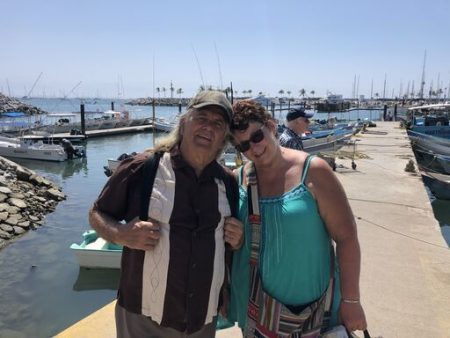
My sweet cousin Jackie from Manitoba came down. She’s my favourite, depending on who’s listening. LOL

Grandson Reece visited during spring break. 14 is a great age.

Bahia de Banderas

La Cruz de huanacaxtle

Puerto Vallarta





Los Ayala, Nayarit

Bucerias, Nayarit
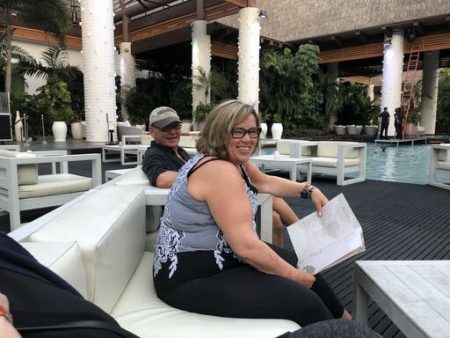
Hubby’s lovable niece and her husband!


IWSG was created by Ninja Captain Alex J Cavanaugh — because Alex understands we need a safe place to congregate, insecurity is part of our creative nature, and together we’re stronger.
On the first Wednesday of each month, you can write on any subject related to your writing journey or adopt the option of answering the month’s question. Either way, you’re in safe territory.
If this sounds like a good place to be, sign up here.
IWSG’s Twitter handle is @TheIWSG and hashtag is #IWSG.
Every month, we announce a question that members can answer in their IWSG post. These questions may prompt you to share advice, insight, a personal experience or story. Include your answer to the question in your IWSG post or let it inspire your post if you are struggling with something to say.
Remember, the question is optional!
March 4 question – Other than the obvious holiday traditions, have you ever included any personal or family traditions/customs in your stories?The awesome co-hosts for the March 4 posting of the IWSG are Jacqui Murray, Lisa Buie-Collard, Sarah Foster, Natalie Aguirre, and Shannon Lawrence!When you’ve got a moment, could you please stop by and thank the hosts for their time. They’re the reason nobody gets left without visitors.The post IWSG – March 2020 – Life Changing 2019 appeared first on Joylene Nowell Butler.



